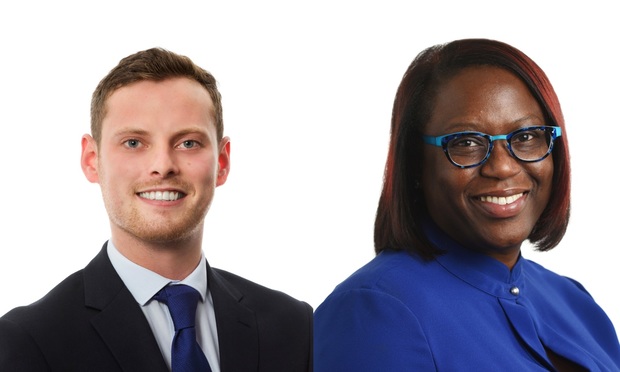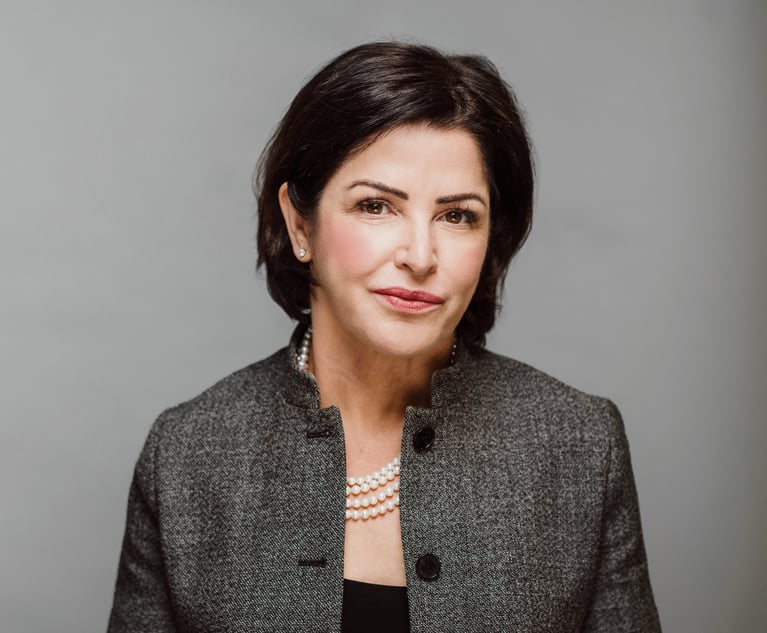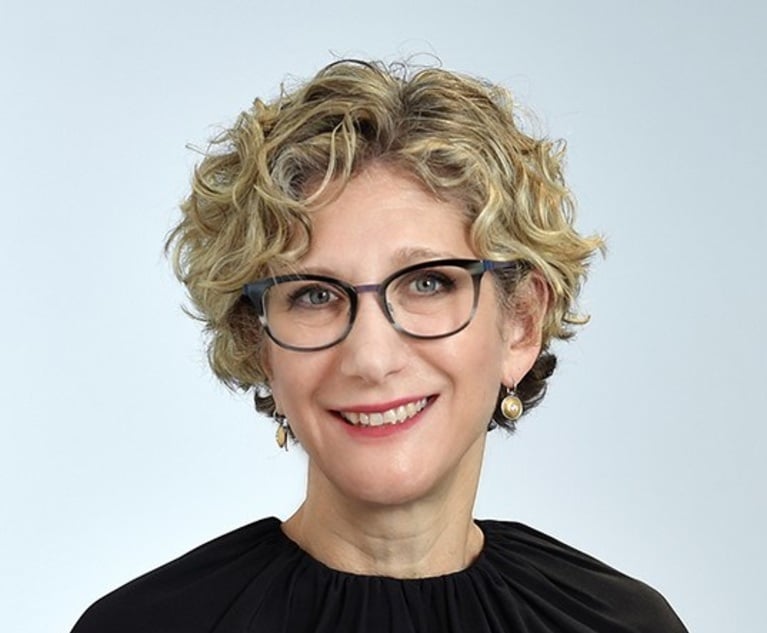From Stonewall To George Floyd: What Lessons Can Be Learned For LGBTQ+ Allyship?
"Black people on their own cannot bring about the change they deserve because the racism they face is systemic," say two Trowers & Hamlins lawyers.
June 29, 2020 at 03:11 AM
5 minute read
 Julian Jarrett and Yetunde Dania, Trowers & Hamlins
Julian Jarrett and Yetunde Dania, Trowers & Hamlins
Trowers & Hamlins partner Yetunde Dania and lawyer Julian Jarrett explain the importance of having allies to speak up on issues of inequality regarding race and sexuality within the legal industry, and say that this is a pivotal moment to go about improving the workplace environment for black and LGBT+ people.
The brutal eight minutes and 46 seconds it took to murder George Floyd has, quite rightfully, got the whole world talking about racism against black people and its eradication.
Black people on their own cannot bring about the change they deserve because the racism they face is systemic. This is because the subtleties in the racism black people face emanate from practices throughout society, be they social, commercial or institutional. Such racism results in black people being discriminated against, and being treated less favourably than white people when it comes to crucial issues such as criminal justice, employment, housing, healthcare, political power, education and so on.
It is evident from the global protests taking place that black people are not alone in their demand for fair treatment and equality of opportunity. Such acts of allyship are reminiscent of LGBTQ+ Pride marches, a timely comparison given June is LGBTQ+ Pride month.
LGBTQ+ Pride month is a time when the U.S. and countries across the world come together to commemorate the 1969 Stonewall Uprising. The Uprising was in response to a violent and unprovoked early morning police raid of the Stonewall Inn, New York, a popular bar for LGBTQ+ folk. A watershed in the history of LGBTQ+ people, Stonewall is considered to be the starting point of a movement fighting for social justice and equality for the LGBTQ+ community.
Every year since 1969 the Pride movement has expanded, Pride marches across the globe have grown to enormous numbers, marching against the discrimination and unfair treatment of LGBTQ+ people historically and which still exists today.
Pride marches are often over-subscribed, with many corporate and individual allies seeking to take part and make a show of LGBTQ+ allyship. There are debates about what constitutes "true" acts of allyship but the fundamental point that people "show up" for Pride is something the LGBTQ+ community have been able to count on by and large.
The term "Ally" is used to describe people who do not identify with a minority group, but acknowledge the discrimination they suffer, and seek to support them in way that will advance equality. For example, at Trowers & Hamlins our LGBTQ+ and Allies Network (one distinct network that is part of our diversity and inclusion inititative TrowersIncludes) incorporates allies in all its network activities, we see allies as integral to our work in raising awareness; promoting acceptance, and celebrating peoples' identities; and eradicating ignorance and bullying.
But when we look to undertake LGBTQ+ initiatives, from fundraising for and providing pro-bono advice to LGBTQ+ charities, running awareness raising events; or implementing a more inclusive recruitment strategy; it is impossible to make progress in this respect without the help of allies.
In the wake of George Floyd's murder and the global public outcry of the treatment of black people, allyship still feels like a relatively new concept in respect of outwardly helping to advance the equality of opportunity and fairness for black legal professionals.
But seeing how, as a concept, it has helped to shine a much needed lens on, and bring about change for LGTBQ+ legal professionals it is evident that White, Asian and Minority Ethnic people have a very important role to play in the advancement of black people at this time, the outcome of which will benefit us all.
George Floyd's murder is a shocking illustration of police brutality in the U.S., but it appears to have finally galvanised society to look at the wider systemic and institutional aspects of racism. The legal profession has more nuanced forms of discrimination which requires a tailored response from the sector which the promotion of allyship may help to address.
Surely it is time for the same enthusiasm, demonstrated by the sector and numbers of people involved in Pride initiatives, to be swung behind the black legal community; so that meaningful and lasting change can finally happen.
Read More
"The Fear Of Being Discovered Was Crippling" – One Gay Man's Experience Of Being Out at Work
The Three Barriers Preventing Law From Finding and Nurturing Black Talent
This content has been archived. It is available through our partners, LexisNexis® and Bloomberg Law.
To view this content, please continue to their sites.
Not a Lexis Subscriber?
Subscribe Now
Not a Bloomberg Law Subscriber?
Subscribe Now
NOT FOR REPRINT
© 2025 ALM Global, LLC, All Rights Reserved. Request academic re-use from www.copyright.com. All other uses, submit a request to [email protected]. For more information visit Asset & Logo Licensing.
You Might Like
View All
Pallas Partners Founder On the Disputes Trends to Look Out For in 2025
4 minute read
What to Expect From Teresa Ribera, the EU‘s New Competition Commissioner
6 minute read
Trending Stories
- 1New York-Based Skadden Team Joins White & Case Group in Mexico City for Citigroup Demerger
- 2No Two Wildfires Alike: Lawyers Take Different Legal Strategies in California
- 3Poop-Themed Dog Toy OK as Parody, but Still Tarnished Jack Daniel’s Brand, Court Says
- 4Meet the New President of NY's Association of Trial Court Jurists
- 5Lawyers' Phones Are Ringing: What Should Employers Do If ICE Raids Their Business?
Who Got The Work
J. Brugh Lower of Gibbons has entered an appearance for industrial equipment supplier Devco Corporation in a pending trademark infringement lawsuit. The suit, accusing the defendant of selling knock-off Graco products, was filed Dec. 18 in New Jersey District Court by Rivkin Radler on behalf of Graco Inc. and Graco Minnesota. The case, assigned to U.S. District Judge Zahid N. Quraishi, is 3:24-cv-11294, Graco Inc. et al v. Devco Corporation.
Who Got The Work
Rebecca Maller-Stein and Kent A. Yalowitz of Arnold & Porter Kaye Scholer have entered their appearances for Hanaco Venture Capital and its executives, Lior Prosor and David Frankel, in a pending securities lawsuit. The action, filed on Dec. 24 in New York Southern District Court by Zell, Aron & Co. on behalf of Goldeneye Advisors, accuses the defendants of negligently and fraudulently managing the plaintiff's $1 million investment. The case, assigned to U.S. District Judge Vernon S. Broderick, is 1:24-cv-09918, Goldeneye Advisors, LLC v. Hanaco Venture Capital, Ltd. et al.
Who Got The Work
Attorneys from A&O Shearman has stepped in as defense counsel for Toronto-Dominion Bank and other defendants in a pending securities class action. The suit, filed Dec. 11 in New York Southern District Court by Bleichmar Fonti & Auld, accuses the defendants of concealing the bank's 'pervasive' deficiencies in regards to its compliance with the Bank Secrecy Act and the quality of its anti-money laundering controls. The case, assigned to U.S. District Judge Arun Subramanian, is 1:24-cv-09445, Gonzalez v. The Toronto-Dominion Bank et al.
Who Got The Work
Crown Castle International, a Pennsylvania company providing shared communications infrastructure, has turned to Luke D. Wolf of Gordon Rees Scully Mansukhani to fend off a pending breach-of-contract lawsuit. The court action, filed Nov. 25 in Michigan Eastern District Court by Hooper Hathaway PC on behalf of The Town Residences LLC, accuses Crown Castle of failing to transfer approximately $30,000 in utility payments from T-Mobile in breach of a roof-top lease and assignment agreement. The case, assigned to U.S. District Judge Susan K. Declercq, is 2:24-cv-13131, The Town Residences LLC v. T-Mobile US, Inc. et al.
Who Got The Work
Wilfred P. Coronato and Daniel M. Schwartz of McCarter & English have stepped in as defense counsel to Electrolux Home Products Inc. in a pending product liability lawsuit. The court action, filed Nov. 26 in New York Eastern District Court by Poulos Lopiccolo PC and Nagel Rice LLP on behalf of David Stern, alleges that the defendant's refrigerators’ drawers and shelving repeatedly break and fall apart within months after purchase. The case, assigned to U.S. District Judge Joan M. Azrack, is 2:24-cv-08204, Stern v. Electrolux Home Products, Inc.
Featured Firms
Law Offices of Gary Martin Hays & Associates, P.C.
(470) 294-1674
Law Offices of Mark E. Salomone
(857) 444-6468
Smith & Hassler
(713) 739-1250









